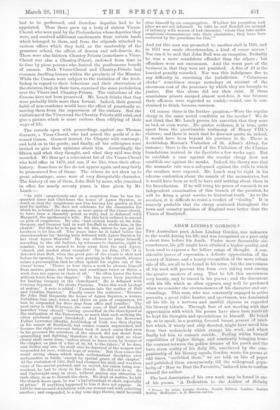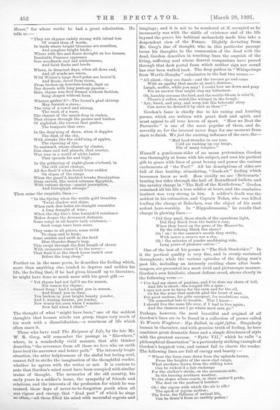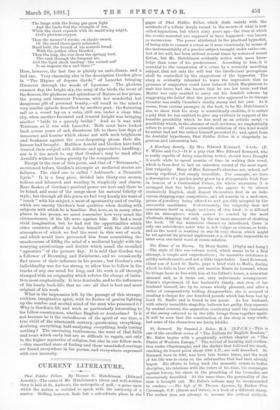ADAM LINDSAY GORDON.*
THE Australian poet, Adam Lindsay Gordon, was unknown to the world during his life, and was recognised as a poet only a short time before his death. Under more favourable cir- cumstances, his gift might have attained a higher quality, and been used to express a far loftier range of thought. A con- siderable power of expression, a delicate appreciation of the beauty of Nature, and a hearty recognition of the more robust side of life, are all to be found in his verse ; but the unevenness of his work will prevent him from ever taking rank among the greater masters of song. That he felt this unevenness very keenly, may be traced in his poems ; and the discontent with his life which so often appears, may well be pardoned when we consider the circumstances of his character and sur- roundings. This man, who was constantly engaged in active pursuits, a great rider, hunter, and sportsman, was dominated all his life by a nervous .and morbid shyness as regarded his literary talents. Through fear of not meeting with that appreciation with which 'his poems have since been received, he kept his thoughts and speculations to himself. He boxed up, so to speak, in a panting, fevered breast, powers of intel- lect which, if wisely and ably directed, might have saved him from that melancholy which stamps his work, and which finally led him to commit suicide. Feeling within himself capabilities of higher things, and constantly bringing home the contrast between the golden dreams of his youth and the bare, stern reality of his daily .life, unrelieved by the com- panionship of his literary equals, Gordon wrote his poems at odd times, " scribbled them," we are told, on bits of paper and published them anonymously, till the widespread popu- larity of " How we Beat the Favourite," induced him to confess himself the author.
The best description of his own work may be found in one of his poems, "A Dedication to the Author of Hohaby
4' Poems. By Adam Lindsay Gordon, Fourth Edition. London: Samuel Molbourue : A. M. Massina and Co. House," for whose works he bad a great admiration. He tells us :— " They are rhymes rudely strung with intent lees
Of sound than of words, In lands where bright blossoms are scentless, And songless bright birds ; Where with fire and fierce drought on her tresses, Insatiable Summer oppresses Sere woodlands and sad wildernesses, And faint flocks and herds.
Where, in dreariest days, when all dews end, And all winds are warm, Wild Winter's large flood-gates are loosen'd, And floods, freed from storm, From broken-up fountain-heads, dash on Dry deserts with long pent-up passion— Here rhyme was first framed without fashion, Song shaped without form.
Whence gather'd P—The locust's glad chirrup May furnish a stave; The ring of a rowel and stirrup, The wash of a wave.
Tho °haunt of the marsh-frog in rushes, That chimes through the pauses and hushes Of nightfall, the torrent that gushes, The tempests that rave.
In the deep'ning of dawn, when it dapples The dusk of the sky, With streaks like the redd'ning of apples, The ripening of rye.
To eastward, where cluster by cluster, Dim stars and dull planets, that muster, Wax wan in a world of white lustre That spreads far and high; In the gathering of night-gloom o'erhead, in The still silent change, All fire-flush'd when forest trees redden On slopes of the range.
When the gnarl'd, knotted trunks Eucalyptian Seem carved, like weird columns Egyptian, With curious device—quaint inscription, And hieroglyph strange."
Then come the exquisite lines :-
" In the Spring when the wattle gold trembles 'Twixt shadow and shine, When each dew-laden air-draught resembles A long draught of wine; When the sky-line's blue burnish'd resistance Makes deeper the dreamiest distance, Some songs in all hearts hath existence,— Such songs have been mine.
They came in all guises, some vivid To clasp and to keep; Some sudden and swift as the livid Blue thunder-flame's leap. This swept through the first breath of clover
With memories renew'd to the rover—
That flash'd as the black horse turn'd over Before the long sleep."
Further on in the same poem, he describes the feeling which, more than anything else, tended to depress and sadden his life, the feeling that, if he had given himself up to literature, he might have done so much more with his great gift :- " Yet rhyme bad not fail'd me for season,
Nor reason for rhyme; Sweet Song ! had I sought you in season, And found you in time. You beckon in your bright beauty yonder, And I, waxing fainter, yet fonder,
Now weary too soon when I wander—
Now fall when I climb."
The thought of what "might have been," one of the saddest thoughts that human minds can grasp, tinges very much of
his work with a dissatisfaction,—a weariness of life which often mars it.
Those who have read The Enigmas of Life, by the late Mr.
W. R. Greg, will remember the passage in "Elsewhere," where, in a wonderfully vivid manner, that able thinker
describes "the severance from all those we love who on earth have trod the narrower and better path." The intensely tragic situation, the utter helplessness of the sinful but loving soul, cannot fail to strike the imagination of the thoughtful reader, whether he agrees with the writer or not, It is curious to note that Gordon's mind must have been occupied with similar trains of thought. The memories of the old country, his early years in a soldier's home, the sympathy of friends and relations, and the interests of the profession for which he was trained, those days of never-to-be-forgotten youth when all was vigour and energy, that "dead past" of which he sings so often,—all these filled his mind with mournful regrets and
longings ; and it is not to be wondered at if, occupied as he incessantly was with the riddle of existence and of the life beyond the grave, his habitual melancholy made him take a. despondent view of the Future. Slightly deviating from, Mr. Greg's line of thought, who in this particular passage turns his thoughts to the communion of the dead with the dead, Gordon describes in touching lines the anguish of the living, suffering soul whose dearest companions have passed through that dark portal from which neither sign nor sound has ever been wafted back. The deep pathos in " Whisperings from Wattle-Boughs " culminates in the last two verses :— " All silent—they are dumb—and the breezes go and come With an apathy that mocks at man's distress ;
Laugh, scoffer, while you may ! I could bow me down and pray For an answer that might stay my bitterness.
Oh, harshly screams the bird, and the wattle-bloom is stirr'd; There's a sullen, weird-like whisper in the bough : Aye, kneel, and pray, and weep, but His beloveds' sleep Can never be disturb'd by such as thou!"
Gordon's fame is chiefly due to his racing and hunting poems, which are written with great dash and spirit, and must appeal to all true lovers of sport. " How we Beat the Favourite " is one of the most popular of them, and de- servedly so, for the interest never flags for one moment from, start to finish. We feel the exciting influence of the race, the- " Mad hoof-thunder in our rear, Cold air rushing up our lungs, Din of many tongues."
Himself a gentleman-rider of no mean pretensions, Gordon was thoroughly at home with his subject, and uses his poetical gift to grace with lines of great beauty and power the various excitements of "the Turf." All his descriptions of rides are full of that healthy, stimulating, " fresh-air " feeling which horsemen know so well. How vividly we see Britomarte bearing her rider through the hail of Roundhead bullets, and the cavalry charge in " The Roll of the Kettledrum." Gordon remained all his life a true soldier at heart, and the combative instinct was very strong in him. A soldier's death was the noblest in his estimation, and Captain Nolan, who was killed leading the charge at Balaclava, was the object of his most ardent hero-worship. In " Hippodromania," he recalls that charge in glowing lines :— "Did they quail, those steeds of the squadrons light,
Did they flinch from the battle's roar, When they burst on the guns of the Muscovite,
By the echoing Black Sea shore ? On on ! to the cannon's mouth they stride,
With never a swerve nor a shy, Oh the minutes of yonder maddening ride, Long years of pleasure outvie !"
One of the best of his poems is " The Sick Stockrider." In it the poetical quality is very fine, and is evenly sustained throughout; while the various episodes of the dying man's past life, including an intensely exciting chase after bush- rangers, are presented in a most vivid and picturesque manner. Gordon's own fatalistic, almost defiant creed, shows clearly in the following verse :— " I've had my share of pastime, and I've done my share of toil, And life is short—the longest life a span ;
I care not now to tarry for the corn and for the oil,
Or for the wine that maketh glad the heart of man.
For good undone, for gifts misspent, for resolutions vain,
'Tie somewhat late to trouble. This I know—
I should live the same life over, if I had to live again;
And the chances are I go where most men go."
Perhaps, however, the most beautiful and original of all Gordon's lines are to be found in a collection of poems called Ye Wearie Wayfarer : Sys Ballad, in eight fyttes. Singularly human in character, and with genuine truth of feeling, he here combines great dramatic force and a simple directness of style with the greatest success. " Fytte VII.," which he calls " philosophical dissertation" is a particularly striking example of Gordon's happiest vein, and cannot fail to charm the reader. The following lines are full of energy and beauty :—
" Where the burn runs down from the uplands brown, From the heights of the snow-clad range, What anodyne drawn from the stifling town Can be reckon'd a fair exchange For the stalker's stride, on the mountain-aide, In the bracing northern weather, To the slopes where couch, in their antler'd pride, The deer on the perfum'd heather.
Oh! the vigour with which the air is rife! The spirit of joyous motion ;
The fever, the fullness of animal life, Can be drain'd from no earthly potion!.
The lungs with the living gas grow light And the limbs feel the strength of ten,
While the chest expands with its madd'ning might,
God's glorious oxygen.
Thus the measur'd stroke, on elastic sward, Of the steed three-parts extended, }lard held, the breath of his nostrils broad, With the golden ether blended ; Then the leap, the rise from the springy turf, The rush through the buoyant air, And the light shock landing—the veriest serf Is an emperor then and there !"
Here, however, the last line is plainly an anti-climax, and a bad one. Very charming also is the description Gordon gives in " The Rhyme of Joyous Garde," of Lancelot bringing Guenever through the woods of Lyonesse. The glorious summer day, the bright sky, the song of the birds, the scent of the flowers, the gladness and splendour of Nature at her prime, the young and innocent Princess, with her wonderful but dangerous gift of personal beauty,—all recall to the mind a very similar episode described by another poet : the fluttering sail as a vessel lay on a calm, still sea, under a clear blue sky, when another favoured and trusted knight was bringing another "bride to a queenly bridal." And as it was with Tristram, so it was with Lancelot. Both must have looked back across years of sad, disastrous life to those last days of innocence and honour which shone out with such brightness and freshness against the ever-deepening gloom their dis- honour had brought. Matthew Arnold and Gordon have both treated their subject with delicate and appreciative handling ; amr is it too much to say that Gordon's may be read after Arnold's without losing greatly by the comparison.
Except in the case of this poem, and that of " Britomarte," mentioned before, Gordon's attempts at mediaeval stories are failures. The chief one is called " Ashtorath : a Dramatic Lyric." It is a long piece, divided into thirty-one scenes, tedious and laboured, and wanting in simplicity and charm. Rare flashes of Gordon's poetical power are here and there to be found, and some of the songs show his natural felicity of
style ; but through all this poem we feel very keenly his want of " touch " with his subject, a want of spontaneity and of reality, which are among Gordon's best qualities when dealing with subjects with which he is familiar. But here, as in many other places in his poems, we must remember how very much the circumstances of his life were against him. He bad a most vivid imagination, but he had not the opportunities which older countries afford to imbue himself with the old-world atmosphere of which we feel the want in this sort of work, and which would have prevented him from committing the anachronism of fillihg the mind of a mediaeval knight with the wearying questionings and doubts which assail the so-called " agnostics " of the present day. It is said that Gordon was a follower of Browning and Swinburne, and we occasionally find traces of their influence in his poems ; but Gordon's own individuality was far too strong to allow him to follow in the tracks of any one mind for long, and his work is all through stamped with an originality which refutes the charge of imita- tion most emphatically. It is to Australia, and to the influences of his lonely bush-life, that we owe all that is best and most original of his work.
What is the impression left by the passage of this strange, reckless, imaginative spirit, with its flashes of genius lighting
up the sombre and morbid mind of the man who possessed it ? Why is Gordon's life and work so particularly interesting to his fellow-countrymen, whether English or Australian ? Is it Rot because he is the embodiment of the spirit of our time, a true child of the nineteenth century, questioning everything, doubting everything, half-analysing everything, truly testing nothing P The unceasing restlessness, the want of that faith and trust which early lost are so difficult to regain, not only
in the higher mysteries of religion, but also in our fellow-men, —this unsettled state of feeling and these unsatisfied cravings are found everywhere in his poems, and everywhere expressed with rare intensity.




































 Previous page
Previous page